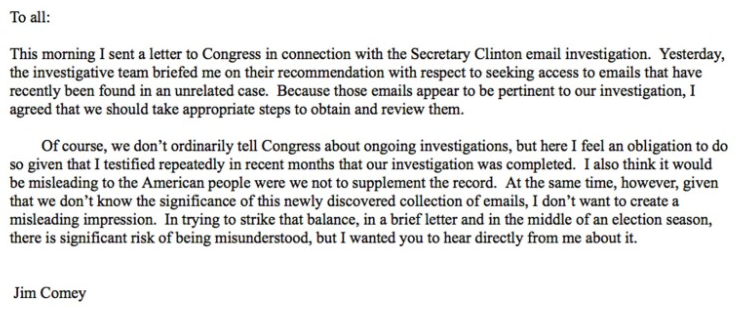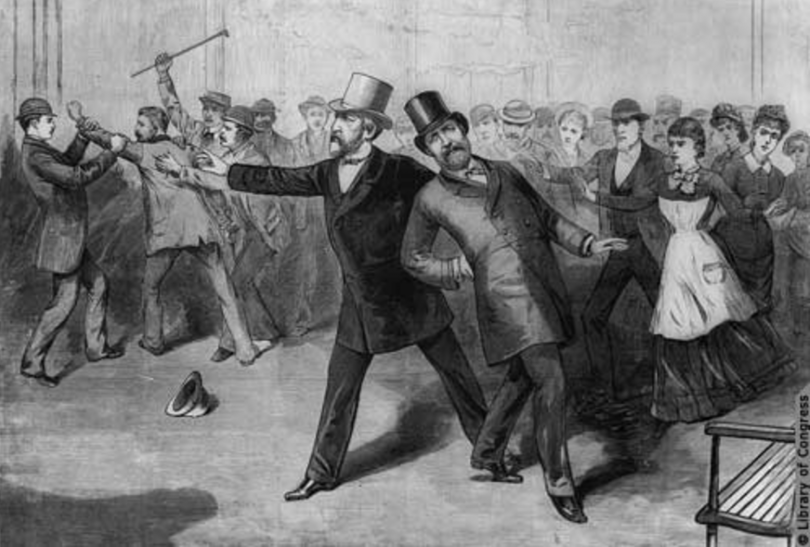Update Oct. 30, 2016, 3 p.m. PT: US Senator Harry Reid has sent a letter to FBI director James Comey, castigating him for sharing misleading information about Hillary Clinton Friday, while at the same time keeping FBI evidence linking Donald Trump and his campaign to Russian president Vladimir Putin, espionage and Wikileaks from the American public. Read the letter below.
aNewDomain — It’s been just two days since most US media incorrectly reported that the FBI was taking a second look at official emails Hillary Clinton sent during her tenure as US secretary of state.
And the storm rages on around FBI director James Comey, who started it all with a vague, three paragraph letter implying the agency was reopening its closed Hillary Clinton email inquiry.
The Clinton campaign spent the weekend trying to recover from the flap, which tanked financial markets and led millions into falsely assuming the FBI was reopening its closed case against Clinton. In actuality, a few hours after Comey’s disclosure Friday, FBI officials backtracked, saying the new email evidence Comey described in his Friday letter had yet to be read by the agency — and that they hadn’t reopened the case.
The fallout is just beginning.
Hours ago, US Senate minority leader Harry Reid sent a blistering letter to Comey, blasting him for a “disturbing double standard.” On the one hand, Comey has been refusing calls to make “explosive” new evidence tying GOP candidate Donald Trump to Russian leaders and spying efforts, while at the same time “jumping at the first opportunity” to use innuendo to cast Clinton in “the most negative light possible.”
In the letter, Reid also says Comey may have violated the Hatch Act, which prohibits federal employees or powerful agencies like the FBI from engaging in partisan politics or using their positions to influence politics.
“In my communications with you and other top officials in the national security community,” wrote Reid, “it has become clear that you possess explosive information about close ties and coordination between Donald Trump, his top advisors and the Russian government — a foreign interest openly hostile to the United States …
“The public has a right to know this information,” Reid continued.
“I wrote to you months ago calling for this information to be released to the public … And yet you continue to resist calls to inform the public of this critical information,” he said. But “as as soon as you came into possession of the slightest innuendo related to Clinton you rushed to publicize it in the most negative light possible.”
Read the full text of Reid’s Oct. 30 letter to FBI director Comey below.
Harry Reid Letter to Director Comey 10-30-2016 by Gina Smith on Scribd
Reid’s letter was the second major missive lawmakers sent to FBI and DOJ officials this weekend. On Saturday, four top Democrats — US Senators Tom Carper (D-DE), Patrick Leahy (D-VT), Dianne Feinstein (D-CA) and Ben Cardin (D-MD) — wrote a letter demanding that two agencies clear up any “misleading impressions” Comey’s letter caused among American voters beginning Monday, Oct. 31.
Comey’s letter was “troubling,” they wrote, because “it breaks with the longstanding tradition of the Department of Justice and the FBI of exercising extreme caution in the days leading up to an election.”
“Unfortunately,” wrote the senators, “Director Comey’s letter has been misunderstood. It is already being used for political purposes, creating a misleading impression regarding the FBI’s intent and actions. We strongly believe that it is incumbent on the FBI and Department of Justice to act without to delay to dispel any misleading impressions about the emails that have been newly identified, as well as their importance — or lack thereof — to the previous (FBI) investigation involving Hillary Clinton.”
Read the full-text of the senator’s Oct. 29, 2016 letter to the DOJ and FBI, below.
NEW: Congressional Letter to DOJ, Investigation into Possible FBI/Comey Election Tampering by Gina Smith on Scribd
Observers expect the lawmakers’ demand to be among many the DOJ receives on the matter in coming hours and days.
But it wasn’t the first. That distinction belongs to the Democratic Coalition Against Trump (DCAT), a political action group.
DCAT is asking Justice to investigate whether Comey violated The Hatch Act of 1939, a federal law that prohibits federal employees and agencies from engaging in partisan political activities.
The PAC’s original complaint, sent hours after Comey’s letter became public on Friday, included language damning the agency for reopening a closed case. An edited version was rereleased Saturday after it became clear that the FBI in fact wasn’t “reopening” its investigation of Clinton, as media widely and incorrectly reported it.
The FBI’s investigation into Clinton’s emails was closed in July, when the FBI announced it had found no evidence that Clinton improper use of a private email account for some official and classified email communications violated any laws.
Indeed, after the Comey flap, unnamed FBI officials told Newsweek they didn’t reopen the case — and said the “new” emails Comey refers to in the letter weren’t from or to Clinton, or in her private email.
Then, today, FBI officials speaking to Yahoo News confirmed the agency had not even yet seen the emails Comey eluded to in the letter. It doesn’t yet have the search warrant it needs to access them, they said.
So what are those emails about and who wrote them?
Reportedly, they’re connected to an unrelated investigation into sexting emails allegedly sent by former congressman Anthony Weiner, husband of Clinton aide Huma Abedin, to a teenage girl.
New York’s attorney general launched that investigation in September, which may have spurred the FBI’s interest, according to reports.
If true, then the FBI conceivably has known about the emails for some time.
Weiner did not return aNewDomain’s call for comment today. FBI and DOG reps also have yet to respond to our requests for comment.
Comey’s vague letter and the misimpressions it caused may well have damaged Clinton’s standing with undecided voters, some observers said today, especially given its timing.
The fallout was hardly unexpected, though.
As ABC News reported early Saturday, US attorney general Loretta Lunch and various other DOJ officials strongly discouraged Comey’s plans to share any new information relating to Clinton so close to the Election. FBI policy, and federal law like The Hatch Act, discourages unnecessary disclosures that could impact elections.
According to an IJR report, Lynch and other Justice officials “made it abundantly clear” to (Comey) that they didn’t want him to inform Congress” of its look into emails related or unrelated to the Clinton inquiry.
So did Comey violate The Hatch Act with his letter?
In its complaint to the DOJ on Friday and in the edited version today, the DCAT suggests Comey may have broken the law by sending the letter so close to the election, which could constitute a Hatch Act violation. That federal law, officially subtitled as “an act to prevent pernicious political activities,” prevents all but the president, vice-president and some other high level government officials from using their positions to engage in partisan-driven politics.
Read the official federal employee guide to the Hatch Act below the fold. Ed.
“It is absolutely absurd that FBI Director Comey would support Donald Trump like this with only 11 days to go before the election,” Dworkin is quoted in saying in the first version of the letter, posted Friday.
Comey’s missive to lawmakers “was an obvious attack from a lifelong Republican who used to serve in the Bush White House, just to undermine (Clinton) campaign. Comey needs to focus on stopping terrorists and protecting America, not investigating (Clinton),” Dvorkin continued. “The timing of this announcement, accompanied by the vague facts (about) the investigation, seems as if (FBI director) Comey was making a political move … not a professional one,” he added.
What Dworkin and his organization didn’t mention is a second letter — an internal memo Comey sent to FBI staffers Friday morning. In that memo, he told staffers he anticipated that the letter would pose “a significant risk of being misunderstood,” a risk he didn’t mention or try clarifying for lawmakers. Here’s that memo, below.

Read the newly revised letter asking the DOJ to investigate the matter below. Scroll down further to find the first version of the letter sent to Justice, as well as the letter FBI director Comey’s letter to lawmakers that started the flap.
DCAT DOJ Complaint Re FBI Comey Letter by Gina Smith on Scribd
Below, find Comey’s letter to Republican congressmen on Friday, which kicked off this growing controversy.
FBI Director James Comey Oct. 28 Letter to GOP Lawmakers by Gina Smith on Scribd
To understand more about whether the DOJ should investigate the FBI for violating the Hatch Act, which prohibits political intervention by US executive branch employees, check out the following guide on the Hatch Act for US federal workers.
Hatch Act – A Guide for Federal Employees by Gina Smith on Scribd
You don’t have to rely on Trump or Hillary supporters’ renditions on what the FBI determined after investigating Hillary’s emails earlier this year. Here are all four and a half hours of Comey’s testimony to congress in July, unedited and in full.
For aNewDomain, I’m Gina Smith.
Cover image: US Library of Congress, Public Domain. Hatch Act summary image: DFLduluthexposed.com, All Rights Reserved.













